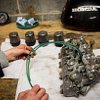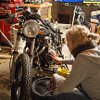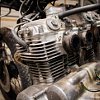“I am going to buy my first motorcycle but I wasn’t going to tell you because I didn’t want you to get pissed at me,” she said, while raising her cup to her lips. Water cooler banter around our office is always a bit different from my days teaching public school.
At this point, you are probably wondering, “Why would a young woman, working for a motorcycle company, expect to upset anyone for wanting to buy her first bike?”
You and me both. So I asked.
Turns out Mildred (her name has been changed due to the fact that her mom still doesn’t know the conclusion to this story) was scouring Craigslist ads for vintage machines from the 1970s to bring home as her first ride. She was catching flak from folks around the office who had opinions about her buying a vintage machine for her first bike. As someone who has two bikes in my garage older than me (I am staring down the barrel of turning 32) I could understand the concern.

Even if it is bone stock, a bike nearly 40 years old is going to need attention. Expect bikes of that age to need points and condensers or a conversion to an electronic ignition and a valve check. Wheel and steering head bearings are almost always worn, chains are usually neglected, and the carbs will surely need work (thanks, ethanol!). But, it probably isn't bone stock, so you are also going to have to address the “customization” decisions by the previous owner(s).

By "customization," I mean “Shit the previous owner did wrong.” I have a 1976 Honda CB550 in my garage right now that I got for a couple hundred bucks and a case of beer because the previous owner, my buddy Stevie, couldn’t figure out why he kept blowing the main fuse at stop signs. Turns out whoever installed the Dynatek ignition ran the wires on top of the frame backbone, and whenever you came to a stop, the seat would pinch the wire against the frame, grounding out the unit and blowing the main fuse. I called Stevie and told him he should fire his mechanic. Turns out he installed it himself.
Now, if you are familiar with working on motorcycles, none of these things are that intimidating. And if you are not relying on said vintage machine as your only form of two-wheeled transportation, I wholeheartedly condone keeping a project or two like this hanging around in the garage. It keeps your brain busy and your hands dirty. However, not only was this Mildred’s first bike, and her only one at that, but she also had no working knowledge of wrenching on a motorcycle, no tools, no garage, and no riding experience. Needless to say, I could see the validity in our coworkers' opinions. While it probably wasn’t the best choice, I wanted to be positive.
I talked with her about the pros and cons of vintage bikes and in the end she was more determined than ever to buy an old bike and learn how to work on it. Can’t fault her for that. But then she concluded her thought with, “After all, you can help me if I get stuck.”
Let’s pause here for a moment.
She said, "you can help me if I get stuck," but what I heard was something along the lines of, “I have no idea what I am doing, but you do, and I am hoping you will spend countless hours of your precious free time working on my bike for me. But don’t worry, I’ll give you a six pack in return.”

Don’t get me wrong. I have no problem helping out a friend and imparting a little wisdom when I can. Lord knows I have had some helping hands along the way. When I was apprenticing at an auto shop in college, I drove Lenny, the master tech assigned to me, up a wall with questions until he would throw something at me. Getting nailed in the head with a rachet usually meant “Shut up and stop asking questions.”
I am usually the first to invite you to bring your bike over to learn how to change your oil, adjust your valves, or replace a worn wheel bearing. You can use my tools and we’ll drink your beer. But that’s not what we are talking about here. We are talking about Mildred buying a bike and having me do a complete overhaul, or worse, an overhaul while Mildred helps.

You see, I have a soft spot for two things in my life:
- The prospect of adding another vintage motorcycle to my garage, even if I don’t own it.
- Proving the validity of bringing back shop classes in high school by teaching someone the difference between a flathead and Phillips head screwdriver.
This is how I came to find a 1973 Honda CB350F sitting in pieces in my garage. It won’t hold an idle, it’s leaking fuel, the front brake is locked up, the chain and sprockets are rusted fast, the fork seals are leaking, the wiring is a rat’s nest, and the previous owner “customized” it just enough that the Clymer manual on my workbench only tells half the tale. On the upside, I am not going to have to pay for beer for the next month.

If, like Mildred, you are thinking about buying a vintage machine as your first bike, I would just ask you to consider all of your options. If you go through with it, make sure you have a patient, knowledgeable friend with plenty of tools who is willing to help you out. At that point, all that’s left is to figure out what kind of beer they drink.
Mildred, if you’re reading this, I drink IPAs.











